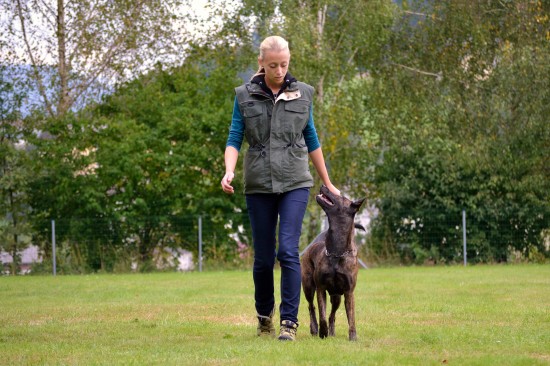

If you are having problems with your dog that you are not able to solve at home and that regular training classes won’t be able to deal with, your dog trainer or vet may have suggested that you enlist the help of a canine behaviourist. Behaviourists are experts in the field of studying and interpreting the natural behaviours, responses and actions of a specific type of animals, and in this case, we are of course talking about dogs! This is why a canine behaviourist might be able to help you to suss out confusing behaviour in your dog, or be able to offer you an insight into something that was not immediately obvious.
However, behaviourism isn’t only useful when your dog is having a problem or something is going wrong; it can also help you to better understand even the normal behaviour of your dog, what it means to them, and how they read your responses.
Read on to learn more about canine behaviourism, what it is, and how it works!
The ultimate goal of modern canine behaviourism is to enable positive reinforcement and remove the use of negative responses, in order to work symbiotically with the dog in a non-confrontational manner. Behaviourism takes in a whole range of skills, as well as the simple understanding that comes from long observation; behaviourists are also experienced trainers, who can utilise the skills that they have developed from reading and interpreting the dog’s behaviour, to know the best approaches to modify or correct it!
Behaviourists hold a deep understanding of canine body language, the mind process of the dog and what types of responses the dog is likely to have to certain things; they then utilise these skills to improve the dog’s general happiness or condition, and minimise or remove any negative behaviours that the dog might be displaying. Ultimately, the behaviourist will teach the owner or handler of the dog the skills that they need to work directly with their own dog to achieve the same result. This is why behaviourism is often the last resort for people who own aggressive, unruly or potentially problematic dogs, for whom regular training proves ineffective.
The whole scaffold upon which behaviourism is built is positive reinforcement, and teaching the dog that positive behaviour gains a positive reward, as well as demonstrating to the owner or handler that a positive reward gains better behaviour than a negative punishment!
Whether you realise it or not, the chances are that you use certain elements of applied behaviourism yourself, in your everyday interactions with your dog! Simply training and handling your dog involves simple behaviourism at work, such as petting your dog if they are good, or giving them a treat if they do something special. When your dog shows an irrational fear or aggression response to something, ignoring this so that your dog observes from you that there is nothing to fear falls under the heading of behavioural counter-conditioning, while letting your dog have a moment to check out something new so that they are not afraid of it before you urge them forwards involves behaviour desensitisation!
Oftentimes, the only time that people think about or talk about canine behaviourism is when they are talking about a dog with a problem, and calling in an expert to help to assess and correct the problem behaviour. While it is certainly true that this is one important element of behaviourism, and often, the one that professional behaviourists spend most of their time working on, it is by no means the only benefit or application of behaviourism!
Because simple behaviourism is something that is often not fully understood by the lay dog owner, and is often bandied about in hushed terms such as “dog whisperer,” it takes on a somewhat mystical or un-knowable association in some people’s heads, when in reality, behaviourism is highly scientific, and something that any well-informed dog owner can benefit from!
Behaviourism can help to correct problems in the dog, such as inappropriate toileting, destructive behaviour or aggression, as well as help a new dog to settle into the existing household. Behaviourism does not only involve dealing with or correcting something in the dog themselves, but often, training or informing the owner too about how to deal with or handle any given issue.
This is why it can be so helpful to have an outside party observe both dog and owner, and not just the dog, in order to work on a cohesive plan of action for change in both the dog, and the owner.
Added to this, behaviourists may also work closely with dogs in rehoming shelters in order to correct problem behaviours that have resulted from their previous treatment, and enable them to be rehomed safely into the appropriate environment.
 4 Great Home-made Tasty Doggy Treats
4 Great Home-made
4 Great Home-made Tasty Doggy Treats
4 Great Home-made
 Side rails as well as pops with Horse fences make constructive impact
Side rails as well as pops with Horse fences make construc
Side rails as well as pops with Horse fences make constructive impact
Side rails as well as pops with Horse fences make construc
 Keeping Parrots As Pets
Keeping Parrots A
Keeping Parrots As Pets
Keeping Parrots A
 Feeding Your Dog In The Autumn And Winter
Feeding Your Dog
Feeding Your Dog In The Autumn And Winter
Feeding Your Dog
 Boring Ordinary Dog Tags – Are There Better-looking Personalized Dog Tags Out There?
Boring Ordinary Dog Tags – Are There Better-looking Personalized Dog Tags Out There?
Copyright © 2005-2016 Pet Information All Rights Reserved
Contact us: www162date@outlook.com